things not to do after giving birth
DO Prioritize Postpartum Care After Giving Birth
Navigating Postpartum Symptoms: For Optimal Recovery
9 Things Not to Do After Giving Birth
1. Don’t Risk Infection
2. Don't Overdo It
3. Don’t Ignore Healthy Habits
4. Don’t Skip Sleep
5. Don't Isolate
6. Don’t Forget Birth Control
7. Don’t Grin and Bear It
8. Don’t Write Things Off
9. Don’t Catastrophize

How to Avoid Infection Risk After A C-Section Or Vaginal Birth
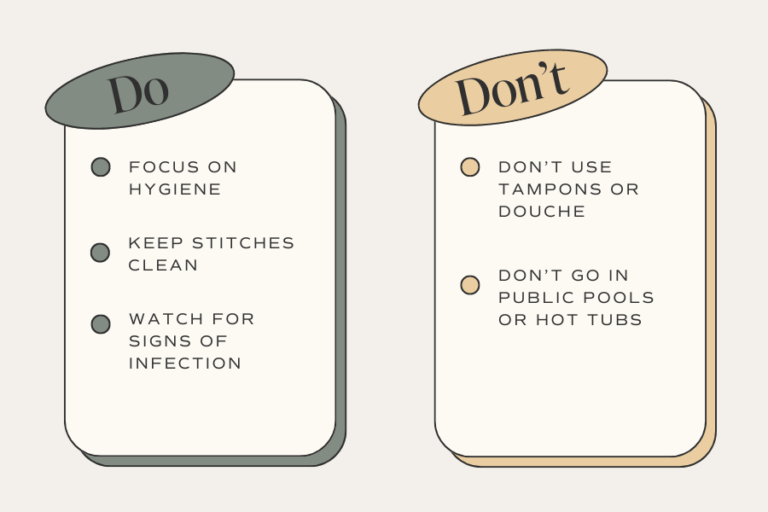
DO:
- Hygiene: Always wash your hands before and after touching your stitches or changing sanitary pads.
- Keep stitches clean: If you’ve had a cesarean section or stitches from an episiotomy, follow your doctor’s instructions on how to care for them.
- Watch for signs of infection: Symptoms like fever, unusual discharge, or increased pain can indicate an infection. Contact your doctor immediately if you notice any of these signs.
- Consult your doctor: Follow all medical advice and immediately report any signs of infection.
DON’T:
- Don’t use tampons or douche: Avoid using tampons or menstrual cups and stick to sanitary pads during this time to reduce the risk of infection.
- Don’t go in public pools: Stay away from swimming pools, hot tubs, and bathing until your bleeding has stopped and any stitches (including a c-section incision) have healed.
Overwhelming Yourself
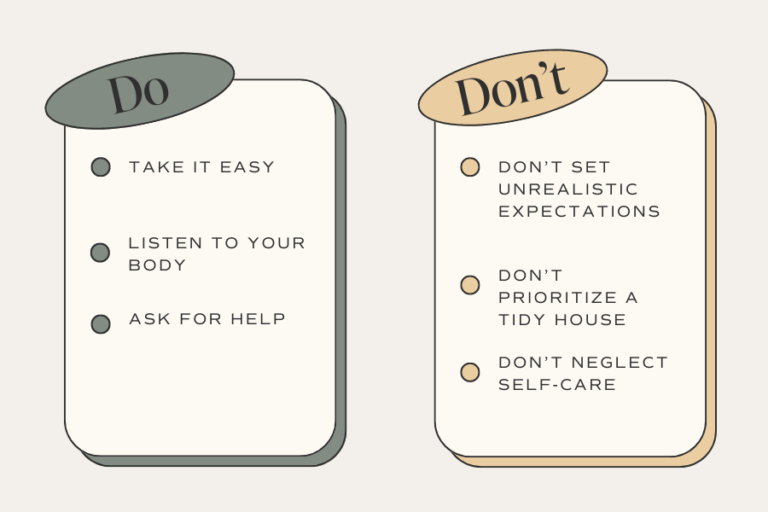
DO:
- Take it easy: Light walking is fine, but avoid rigorous activities and heavy lifting for at least six weeks after baby is born.
- Listen to your body: If you feel pain or extreme fatigue, it’s your body’s way of telling you to slow down.
- Ask for help: Don’t hesitate to rely on your partner, family, or friends for support with household chores and care for your baby. The invisible load of motherhood can create resentment towards your partner, speak up now to avoid these feelings of frustration!
DON’T:
- Don’t set unrealistic expectations: It took you 9+ months to grow this human, your body needs time to recover. Give yourself time and grace. You’re both learning something new everyday.
- Don’t prioritize a tidy house: Prioritize your health and well-being over household chores. If mess bothers you (it does me too!) ask or hire help around the house.
- Don’t neglect self-care: Postpartum self-care is essential during this trying time.
Staying Healthy
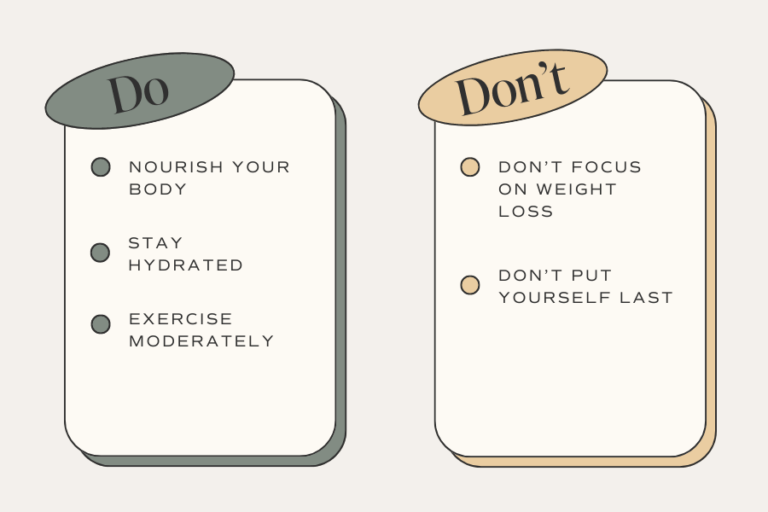
DO:
- Nourish Your Body: Focus on a balanced diet rich in vitamins, minerals, and proteins to aid in healing and energy levels. Continue taking a prenatal or switch to a postnatal vitamin to avoid depletion.
- Stay hydrated: Drink plenty of water, especially if you’re preparing to breastfeed, to stay hydrated and support milk production.
- Exercise moderately: Once cleared by your doctor, engage in light exercises like walking or postpartum yoga to improve your mood and aid recovery.
DON’T:
- Don’t focus on weight loss: Avoid falling into a ‘bounce-back’ mindset. Your goal is a healthy mama and baby postpartum not your jean size.
- Don’t put yourself last: Practice self-care and seek help if you’re experiencing postpartum depression or other postpartum mood symptoms that feel out of character for you.

Getting Restful Sleep
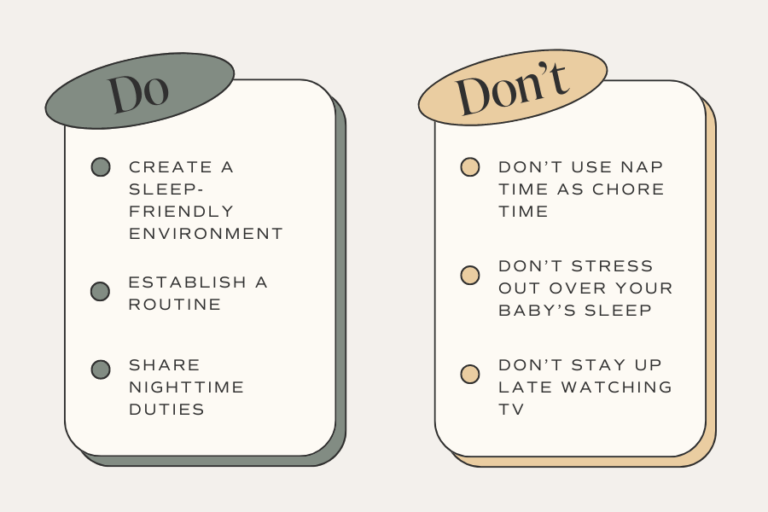
DO:
- Create a sleep-friendly environment: Keep your bedroom dark and quiet to improve the quality of your sleep.
- Establish a routine:A bedtime routine to signal your body that it’s time to wind down.
- Share nighttime duties: If possible, share baby care responsibilities with your partner to get more rest.
DON’T:
- Don’t use nap time as chore time: Take advantage of your baby’s sleep schedule to catch up on rest. Yep, we said it. We recommended sleeping when the baby sleeps.
- Don’t stress out over your baby’s sleep schedule: you may notice concern over baby’s sleeping patterns which can be a significant source of anxiety. Unfortunately their sleep is sporadic in the early weeks. Focus on getting rest when you can.
- Don’t stay up late watching Netflix: I know, I know. You want to squeeze in a little ‘you’ time but the ‘revenge scroll’ made popular on TikTok will not serve you in the long run. It can quickly become a vicious cycle and lead to sleep deprivation which is a known risk factor in perinatal mood and anxiety disorders.
Staying Connected
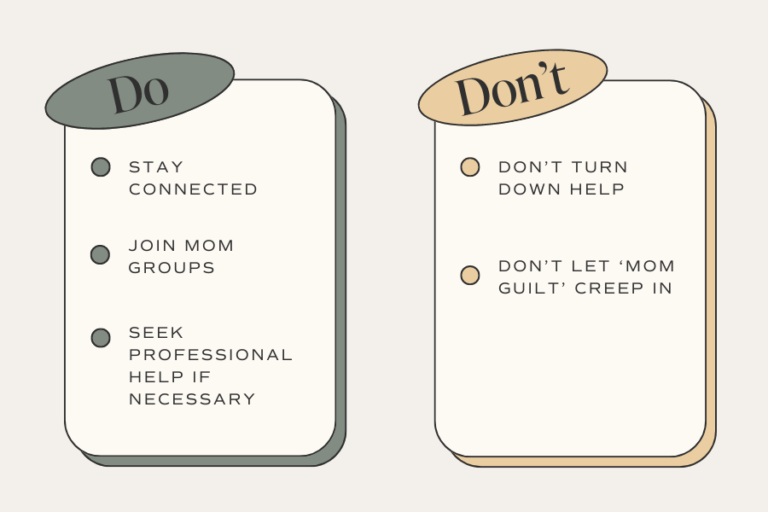
DO:
- Stay connected: Regularly communicate with friends, family, and support groups to avoid feelings of isolation.
- Join a new mom group: Being part of a community with other new mothers can provide emotional support and practical advice.
- Seek professional help: If you’re feeling overwhelmed, don’t hesitate to reach out to a therapist or counselor.
DON’T:
- Don’t turn down help: People want to help, receiving support doesn’t make you inferior.
- Don’t let ‘Mom Guilt’ Creep In: Many moms experience ‘mom guilt’ or feel bad for taking time for themselves once they become a mom. We believe filling your cup first is an essential piece of postpartum self-care. Taking care of you is taking care of your family.
Keep Up Contraception If You're Not Ready to Get Pregnant Anytime Soon
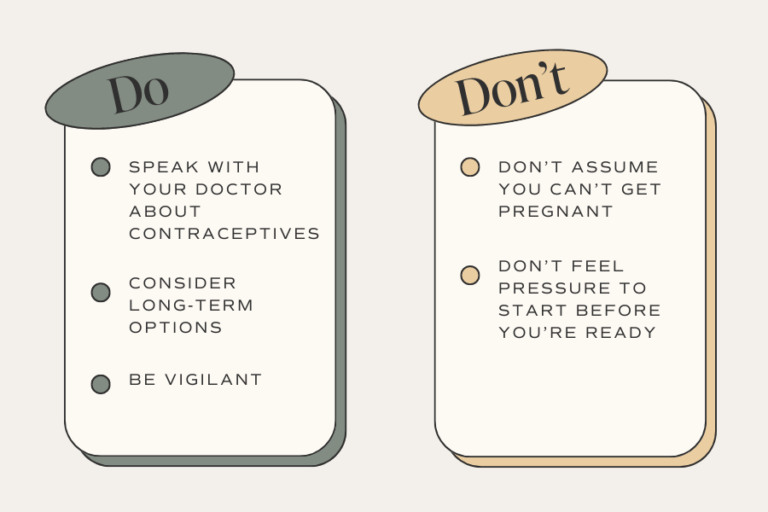
DO:
- Speak with your doctor: Before resuming sexual activity, talk to your healthcare provider about appropriate birth control methods.
- Consider long-term options: Options like an IUD or implant can provide peace of mind if you’re not planning another pregnancy soon.
- Be vigilant: Remember that breastfeeding is not a reliable form of birth control.
DON’T:
- Don’t assume: Your conception journey will be similar to your previous journey.
- Don’t feel pressure: To resume sexual activity even if you’re cleared at your postpartum check-up. Many women (I’d even go as far as most!) do not feel comfortable/ready for intimacy even though they’ve been physically cleared by their doctor. There are many factors that go into this decision. Take your time, mama!
Managing Pain
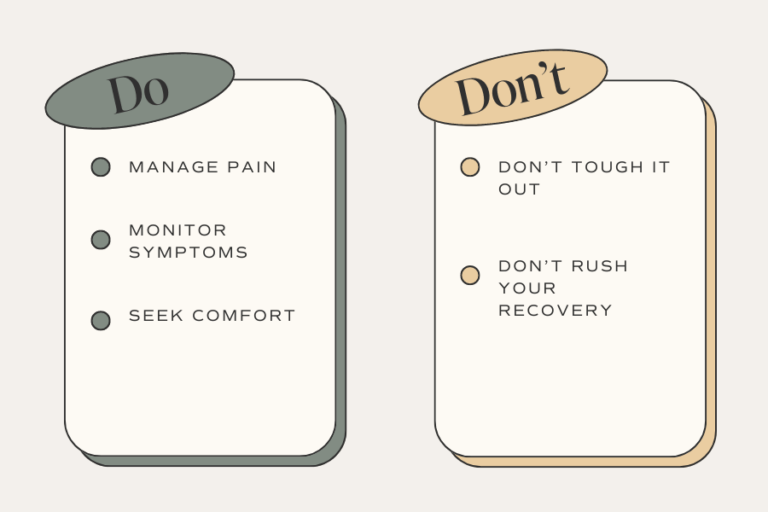
DO:
- Manage pain: Use prescribed medications or over-the-counter pain relievers as recommended by your doctor.
- Monitor symptoms: If pain persists or worsens, consult your healthcare provider to rule out complications.
- Seek comfort: Pay attention to your body, use ice packs, warm baths, and other postpartum essential comfort measures to alleviate discomfort.
DON’T:
- Don’t tough it out: Pain is your body communicating with you. Listen and don’t feel bad asking for assistance. Whether you’ve had a vaginal delivery or c-section it’s important to take it easy and manage your symptoms.
- Don’t rush your recovery: Your body needs adequate time to recover, pushing through pain will only set you back.
Know When to Ask Your Doctor
It’s easy to dismiss new symptoms as just part of the postpartum experience, but some could be a sign of more serious issues. Knowing when to seek professional help can prevent complications.
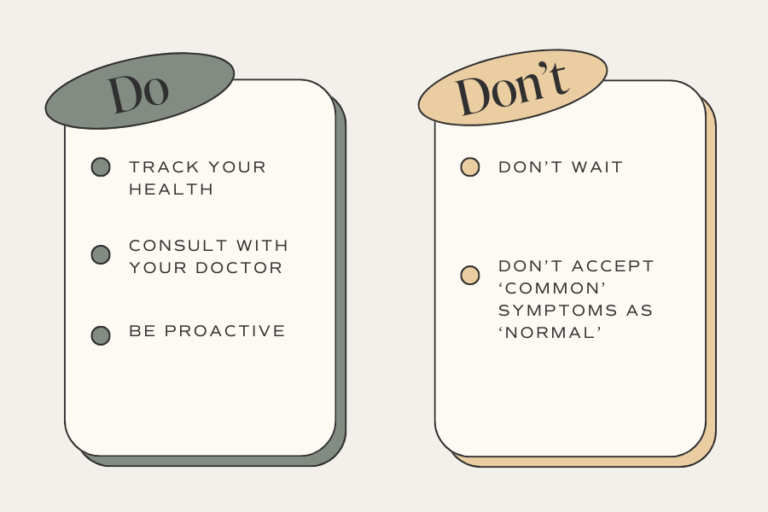
DO:
- Track your health: Keep a diary of any unusual symptoms or changes in your health.
- Consult your doctor: Don’t hesitate to schedule an appointment if something doesn’t feel right in those first few weeks postpartum.
- Be proactive: Early intervention can prevent minor issues from becoming major problems.
DON’T:
- Wait: You can reach out to your OB or healthcare provider before your postpartum checkup. We all have unique situations and you should not wait until the 6 week postpartum appointment with your doctor if you’re feeling extreme pain or discomfort early on as it may be a sign of something more serious.
- Accept common symptoms as normal: Mood swings, feelings of sadness, or anything heavier may be common but that does not mean they should be pushed aside or ignored.
This Won’t Last Forever
It’s normal to feel anxious or overwhelmed, but try to keep things in perspective. Remember, the postpartum period is temporary and things will get better.

Preparing for Your Matrescence
Matrescence, the transition to motherhood, is a profound experience that deserves attention and care.
DO:
- Educate yourself: Read up on what to expect during this transition period. Our best-selling course, Emotionally Preparing for the 4th Trimester is a great place to find science-back education to support you during this monumental transformation.
- Practice Self-compassion: Be kind to yourself and acknowledge the challenges and triumphs of motherhood.
- Create a Postpartum Plan with your partner
- Find Community support: Lean on other mothers who understand what you’re going through. That’s exactly why we created The Matrescence® Membership – a motherhood community to support and celebrate every journey to motherhood.
By following these guidelines on things not to do after giving birth, you can ensure a smoother recovery and a healthier transition into motherhood. If you need additional support or personalized advice, consider reaching out to healthcare professionals or joining a community of new mothers.
Remember, you are not alone on this incredible journey.







